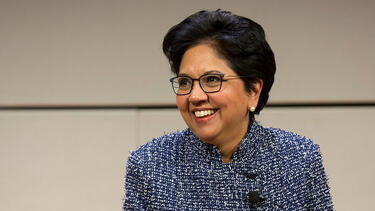Departing PepsiCo CEO Indra Nooyi Did It Her Way
Indra Nooyi ’80, who has served as PepsiCo’s CEO since 2006, announced this week that she will step down this fall. Yale SOM’s Jeffrey Sonnenfeld writes that Nooyi brought a rare combination of intelligence, toughness, and vision to the job.

Indra Nooyi speaking at the Yale School of Management in 2016. Photo: Harold Shapiro.
This article originally appeared in Chief Executive.
Indra Nooyi, as PepsiCo’s CEO, has proven the cynics and numerous cynical managerial truisms wrong. She is one of the most renowned global business leaders, but is not a success cliché or the beneficiary of a traditional career trajectory.
Nooyi announced this week she is stepping down in October. Ramon Laugerta, president at PepsiCo, was named her successor.
Nooyi’s story is proof that the American dream is not in our past. Many lament that the dreams of newcomers to the U.S. are myths than cannot be realized, but Indra Nooyi’s career trajectory provides testimony that the door of opportunity is still open and that merit still matters. Hard work and raw intelligence can still pay off.
She came to this country from Madras, India, a musically talented adventurer with a strong scientific academic background in physics, chemistry, and math. Without the benefit of a personal network of mentors, she soared through the professional ranks of consulting and industry.
Nooyi joined PepsiCo 24 years ago, drawing upon her analytic tools and unbridled creativity. She led the divesture of the Tricon restaurant group (Taco Bell, KFC, and Pizza Hut) into Yum! Brands. This required challenging the vision of the company’s second CEO, who had championed those acquisitions and was still on the board of directors. Fourteen years ago, while serving as both CFO and COO, she reviewed the plans of the company’s CTO for a massive new enterprise resource planning system for the company, then researched information systems over the winter holidays and revamped the plans from scratch on her own. No one was surprised when she rocketed to the CEO position just 12 years after joining PepsiCo, at a time when it was considered one of the most competitive work cultures in business.
She has also demonstrated how leaders can be tough and persuasive without being abusive. Nooyi does not allow others to make a gender caricature of her leadership style, and through diplomacy, she has won over predecessors, colleagues, and even once-hostile activist investors.
An example of this is when she proved out her vision to once-skeptical activist investor Nelson Peltz and his firm Trian Partners. In 2013, they bought a stake in PepsiCo and launched a hostile campaign demanding that Frito Lay snacks be divested from Pepsi’s beverage business. They also said the beverage business in North American be divested from the beverage business in the rest of the world. Nooyi believed in her integrated, brand-building vision with intertwined distribution channels, but welcomed a Trian representative to the board and became friends with Peltz. Three years later, Trian sold their holdings for a remarkable 67% gain—a result of Nooyi’s vision.
Nooyi proved that old companies do not have to live in the past. When celebrating proud legacies, management thought can become anchored in a worship of the past. Nooyi brought an innovation expert in from 3M to spark the company’s creative intellect. She gave her management team cameras and photo albums and sent them off to retailers to discover innovative opportunities.
She also hired a globally renowned endocrinologist and obesity expert to help revolutionize the nutritional base of the companies’ old and new products. While 75% of the company’s products were in the less-healthy category of “fun for you” foods when she became CEO in 2006, today PepsiCo’s tasty “good for you” snacks make up half the product portfolio. Every two years the company has created a new $1 million-plus brand business, moving from 16 to 22 mega-brands.
She proved that the presumed tradeoff between short-term financial returns and long-term investing is a false choice. Through her “Performance with Purpose” mission, Nooyi showed that doing good is not antithetical to doing well. She has led the industry in responsible water use, ended the use of trans fats and dramatically reduced sugar in PepsiCo’s products, introduced recyclable packaging, and achieved other inspiring sustainable and nutritional milestones aimed at helping communities and customers.
At the same time, none of these societal triumphs were at the expense of shareholder wealth, with total shareholder return at 162% vs. peer returns of $130%. PepsiCo shares have more than doubled the rise of those of arch rival Coca-Cola. Earnings were up 9% this year alone. PepsiCo’s earnings were $35 billion when Indra took over and $63.5 billion last year, with the company’s share price nearly doubling in that period.
Nooyi has reached prominence without self-promotion. She has towered over the Fortune and Forbes lists of most powerful leaders (not to mention most powerful women leaders), while winning every award in her industry. But she is not remotely self-aggrandizing. Rather than commission hagiographic profiles and grandiose press releases, she travels the nation and the world talking about PepsiCo’s collective goals.
At only 62 years old, she could have remained in power for many more years but was determined to not make PepsiCo too Indra-centric. Her talented CFO generally led earnings calls and was one of many great prospective succession candidates in an organization with deep bench strength. With such selfless leadership development and trial assignments, when her president Laugerta was named successor, the stock went up despite her sterling performance record.
Frank Sinatra may have sung it first, but surely Indra Nooyi’s karaoke tune tonight is “I did it my way!”